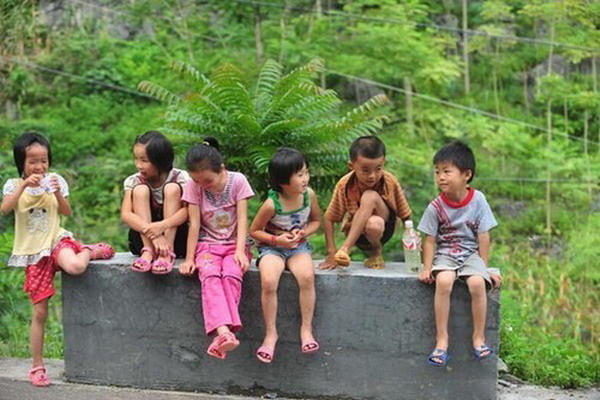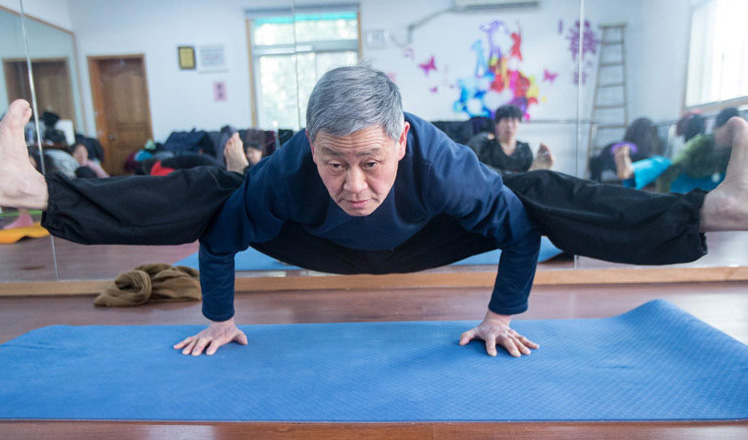Govt, society share onus to protect left-behind kids
Updated: 2016-01-29 07:45
(China Daily)
|
||||||||
 |
|
Qin Xiaohui (R) plays with the other children in his village on July 5, 2012. Qin Xiaohui, then 6, lives in Banlie Village of Bansheng Township in Dahua Yao Autonomous County, South China's Guangxi Zhuang autonomous region. [Photo/Xinhua] |
Premier Li Keqiang's latest call for the government and society to strengthen protection and care for "left-behind" children in rural areas underlines the severity and urgency of the issue.
The call, made at a State Council executive meeting on Wednesday, follows repeated media reports of tragedies involving the country's some 60 million children left behind by their parents working as migrant workers in cities.
Often left without proper parental and societal care, many of such children fall victims to anxieties, anger, accidents and even sexual assaults. Some are involved in anti-social behavior or commit crimes.
It would be immoral if the country does not address the problem.
The issue of left-behind children emerged during the country's modernization process, in which hundreds of millions of farmers flooded into cities in pursuit of a better life.
Yet due to the rigid household registration system and high costs of living and education in cities, it is unaffordable and impractical for many migrants to bring their children with them. They have to entrust the younger generation's education and care to the elderly, who often find the task too demanding.
Urbanization has fueled economic growth over the years but cast a lasting shadow on traditional rural lifestyle, values and customs, aggravating the problems faced by those left behind.
Migrant workers' hard work and cheap labor were major factors behind China's economic miracle over the past decades. The country owes these workers a huge debt, which must be paid back. The prosperity of cities should not be built at the expense of migrant workers' family reunions and happiness.
The issue of left-behind kids is unique to China, and there are few, if any, experiences that the country can draw on in its quest for a solution.
It is encouraging, therefore, that the premier has pointed out practical ways to improve the situation for left-behind children, such as making cities more accommodative to migrants, supporting the efforts of social workers and charity organizations, and building more boarding schools. He also stressed the role that grassroots governments, local communities and schools can play in the children's security, supervision and education.
The premier's pledge to tackle this problem head on marks a top-level push to efforts to lift this very weak and vulnerable social group out of despair. The way they are treated reflects how civilized we want our society to be.
It will be a stain on our collective conscience if we fail to help them out.
- Students must learn safety education, experts say
- 73 bodies recovered from rubble of Shenzhen landslide
- Chinese travelers lead 2015 global outbound tourism
- S Korea to issue 10-year visa to highly-educated Chinese tourists
- A glimpse of Spring Rush: little migrant birds on the way home
- Policy puts focus on genuine artistic students
- Goodwill sets tone at Wang, Kerry's briefing
- Obama picks new Afghan commander
- Ceremony held in Auschwitz Camp to remember the Holocaust
- Thousands of beckoning cat on display in Japan's Goutoku Temple
- Chinese fishing boat capsizes off S. Korean island: Yonhap
- 42 cases of Zika infection reported in N.E. Panama

 Top 10 best selling cars on Chinese mainland 2015
Top 10 best selling cars on Chinese mainland 2015
 Warm memories in the cold winter
Warm memories in the cold winter
 The world's highest library
The world's highest library
 In-flight meal prepared for travel rush ahead of Spring Festival
In-flight meal prepared for travel rush ahead of Spring Festival
 72-year-old teaches yoga for free in Hangzhou
72-year-old teaches yoga for free in Hangzhou
 Sea ice traps boats as cold wave sweeps across East China
Sea ice traps boats as cold wave sweeps across East China
 10 tourists grab free money in one minute in East China
10 tourists grab free money in one minute in East China
 Warm colors at sunrise cast off the chill in Qingdao
Warm colors at sunrise cast off the chill in Qingdao
Most Viewed
Editor's Picks

|

|

|

|

|

|
Today's Top News
National Art Museum showing 400 puppets in new exhibition
Finest Chinese porcelains expected to fetch over $28 million
Monkey portraits by Chinese ink painting masters
Beijing's movie fans in for new experience
Obama to deliver final State of the Union speech
Shooting rampage at US social services agency leaves 14 dead
Chinese bargain hunters are changing the retail game
Chinese president arrives in Turkey for G20 summit
US Weekly

|

|








